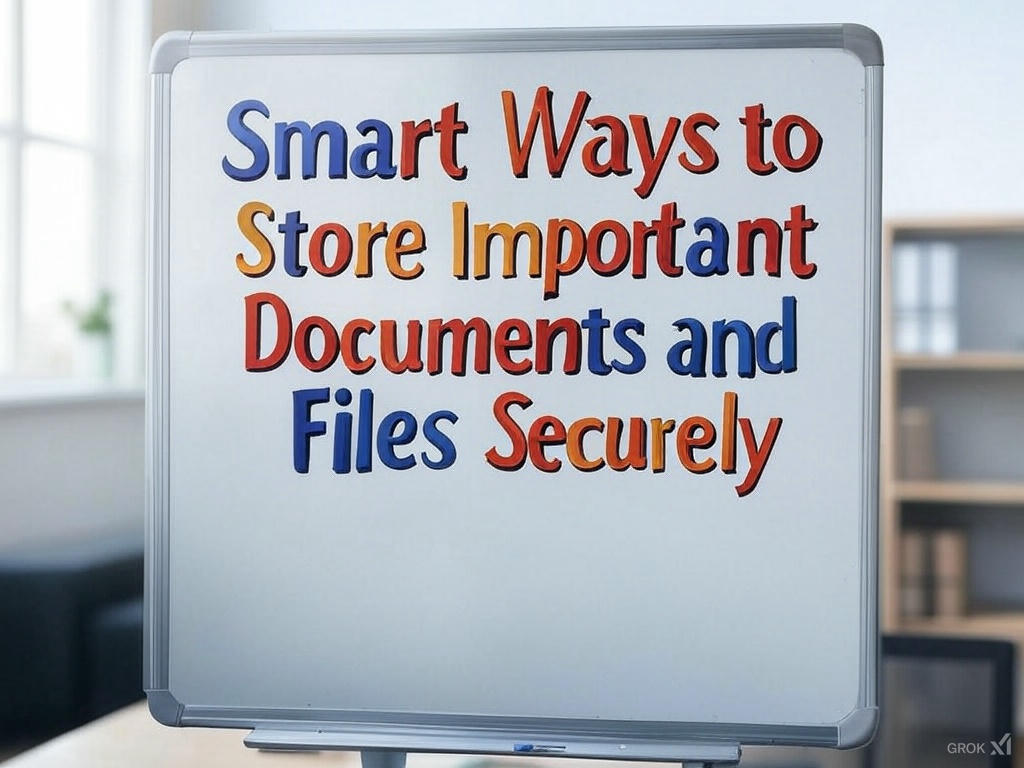Storing important documents and files securely is crucial for protecting sensitive information. Historically, documents were stored in physical cabinets and safes, often in a single location. However, with advancements in technology and increasing data risks, secure storage methods have evolved. Today, it’s important to consider both physical and digital storage solutions. Whether you’re dealing with contracts, financial records, or personal identification documents, the right storage methods ensure that your information remains protected from theft, loss, or damage. This blog will explore various strategies for securely storing your important files, from selecting the proper storage devices to creating secure backups, giving you the peace of mind that your documents are safe and organized.
Observation:
Interestingly, many people overlook the importance of secure document storage until a situation arises. Without a proper system in place, important papers can be lost or exposed to risk. Taking steps to organize and protect your documents now will save time and prevent problems later, ensuring that you can always access your important information when needed.
Assessing Your Document Needs
Before deciding on storage solutions for your important documents, it’s essential to assess your specific needs. Different documents require different levels of security and organization. Start by evaluating the types of files you need to store and how often you need to access them. For example, personal identification documents like passports or birth certificates need to be kept secure, while financial records might only need occasional access.
When assessing your needs, consider the following:
- The frequency with which you need to access the documents
- Whether the documents contain sensitive or private information
- The volume of physical versus digital documents
- The space available for storage
- How long you need to retain each type of document
- Whether the documents need to be shared with others regularly
- The level of protection each document requires
By categorizing your documents based on these factors, you’ll be able to determine the best storage method for each type of file. This step ensures that you invest in the right systems and security measures, keeping your documents well-organized and protected.
Choosing the Right Storage
Choosing the right storage for your important documents depends on several factors, including the volume of files you have, how often you need to access them, and the level of security required. For physical documents, investing in a fireproof safe can protect important papers from damage due to fire or water. If you have a large number of documents that don’t need frequent access, you might consider storing them in a secure off-site facility like NSA Storage Texas – Best Storage Solutions. These facilities provide a safe environment with climate control, which can be beneficial for long-term storage. For digital documents, cloud storage services offer secure backups and remote access. However, it’s important to ensure that the service you choose encrypts your data to protect it from unauthorized access. Another option for digital storage is using external hard drives, which can be kept in a safe place for extra protection. In either case, it’s essential to have a clear system in place for organizing your documents, whether it’s by category, date, or importance. A well-organized storage solution ensures you can quickly retrieve any document you need while keeping them secure.
Facts: Secure storage is essential for protecting sensitive documents from theft, loss, or damage, whether physical or digital.
Organizing Physical Documents
When it comes to organizing physical documents, having a system in place is essential to keeping everything easily accessible and secure. Start by sorting documents into broad categories based on their importance and purpose. For example, you may want to separate personal identification documents, legal papers, financial records, and medical files. Once categorized, store them in labeled folders or binders, using dividers for additional organization. For extra protection, consider using a fireproof safe for your most important documents, such as birth certificates or wills. It’s also a good idea to keep frequently used documents in an easily accessible place, while less-used materials can be stored in boxes or file cabinets. Ensure that your storage area is dry and safe from pests, as these can damage papers over time. Periodically reviewing and updating your documents is also essential. As time passes, certain papers may become outdated, so it’s a good idea to dispose of unnecessary items through secure shredding. Regularly maintaining your system will ensure that you can find what you need quickly, without the stress of digging through piles of disorganized files. By organizing your physical documents carefully, you not only keep them safe but also make your life easier by knowing exactly where everything is when you need it.
Digitizing Documents for Backup
Digitizing important documents is a smart way to create a backup and keep your records accessible. Scanning papers and saving them in organized folders on your computer or cloud service reduces physical clutter and ensures that your documents are safely stored in multiple locations. This digital backup protects against potential loss from damage or theft and makes it easier to access documents on the go, giving you peace of mind knowing your important files are secure.
Maintaining Document Security
Once you’ve organized and stored your important documents, maintaining their security is crucial to protect sensitive information. Whether you’re dealing with physical or digital files, ensuring that they remain secure will help prevent unauthorized access or loss. For physical documents, consider storing them in a locked filing cabinet or safe, particularly for important items like legal documents or financial records. It’s also helpful to use fireproof or waterproof storage solutions to protect against natural disasters. For digital files, encryption is key. Use strong passwords and enable two-factor authentication for cloud services, ensuring only authorized individuals can access your files. You should also regularly back up your digital documents to an external hard drive or secure cloud storage to prevent data loss. To further protect your documents, avoid storing sensitive information on public or unsecured devices. If you no longer need certain documents, make sure to shred them rather than simply throwing them away, as this will prevent personal data from being exposed. Regularly reviewing and updating your security practices is also important. For example, periodically changing passwords and checking the security of your digital storage systems ensures that your information stays protected. By taking proactive steps to maintain security, you can ensure that your important documents remain safe and accessible when needed.
- Secure physical documents in a locked, fireproof cabinet or safe.
- Use encryption and strong passwords for digital files.
- Regularly back up digital files to secure locations.
- Shred outdated physical documents to prevent identity theft.
- Review and update your security practices periodically.
Final Tips for Document Security
Maintaining the security of your important documents is an ongoing process. Regularly review your storage and security systems to ensure they remain effective. Whether using physical or digital storage, always prioritize access control, fireproofing, and encryption. Keep backups up-to-date and make sure sensitive documents are disposed of securely. By staying vigilant and organized, you can safeguard your important information and ensure it’s protected for years to come.






